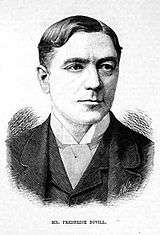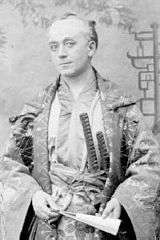Frederick Bovill

Frederick Bovill was an operatic baritone of the late Victorian era best known for his work in the Savoy Operas of Gilbert and Sullivan.
Little is known of his life. A baritone, Bovill created the role of Pish-Tush in The Mikado (1885)[1] and the Squire in Sullivan's romantic opera Ivanhoe (1891).[2]
The Mikado

In the original production of The Mikado it was intended that Bovill should sing the bottom line in the madrigal “Brightly dawns our wedding day”, which includes a bottom F. However, as a light baritone Bovill was unable to reach this note, so the character of Go-To, another "Noble Lord" together with Pish-Tush, was created to sing in this number alone, and the necessary change made to the cast list.[3][4][5]
The Illustrated Sporting and Dramatic News said of him in The Mikado, "Mr. Frederick Bouvill (sic) is a trifle heavy as Pish Tush, but has a very good voice and knows how to make use of it", while The Theatre said "Mr. Bovill (the other recruit) proved an excellent representative of the "general utility" noble Lord, Pish-Tush. This gentleman possesses a fine mellow voice, which he produces very agreeably, and is in all respects an acquisition to the Savoy company.[6]
Later roles
In Gilbert and Sullivan's next production, Ruddigore, there was only one principal baritone role to be cast, resulting in Bovill being released from the D'Oyly Carte Opera Company.[7] From 1887 to 1889 Bovill was on a tour of the provinces with J.W. Turner's English Opera Company as Danny Mann in The Lily of Killarney, Count Arnheim in The Bohemian Girl, Don José de Santarém in Maritana and as Count di Luna in Il trovatore, appearing at Her Majesty's Theatre in Dundee, the York Theatre Royal and the Theatre Royal in Oldham among other venues.[8][9][10] The critic of The Evening Telegraph in Dundee said of Bovill's performance in Maritana:
"Don José was sustained by Mr. Frederick Bovill. He has undoubtedly a baritone voice of excellent timbre and is a pleasing and effective actor, but he deliberately destroys all pleasure the ear should derive from his voice by a persistent tremolo that is most annoying to listen to. If it is a natural defect no more need be said; if it is done for effect it is decidedly bad taste."[11]
The year 1891 saw Bovill once again under the baton of Arthur Sullivan when he appeared as the Squire in the composer's opera Ivanhoe at the Royal English Opera House.
His final appearances on the London stage were as the Chancellor in La Basoche (November 1891 to January 1892) at the Royal English Opera House, while in May 1892 he took part in a recital at the Steinway Hall in London during which he sang 'Time was when Love and I were well acquainted' from The Sorcerer and 'Ho, Jolly Jenkin' from Ivanhoe, the latter being encored.[12] He played Tom Ball in a single matinee performance of the operetta A Hundred Years Ago at the Royalty Theatre in July 1892. The critic of The Era said of him in this, "Mr Frederick Bovill acted and sang with all the ease and certainty of intonation that are expected from so experienced an artist."[13]
In the film Topsy-Turvy (1999) he was played by Michael Simkins. After filming was completed further research revealed that the manager of the bank used by Richard D'Oyly Carte was a Mr Bovill, and it has been conjectured that the two men were one and the same.[14] However, bearing in mind his extensive touring in the north of the country, this is unlikely.
Gallery
-

As Pish-Tush in The Mikado (1885)
References
- ↑ Frederick Bovill in the G & S Opera website
- ↑ Wearing, J.P. The London Stage 1890-1899: A Calendar of Productions, Performers, and Personnel Scarecrow Press (2013) pg 91 Google Book
- ↑ 'The Mikado Trivia' - University of Aberdeen Gilbert & Sullivan website
- ↑ Hudston, Sara Victorian Theatricals A&C Black (2014) pg 282 Google Books
- ↑ Ainger, Michael Gilbert and Sullivan : A Dual Biography: A Dual Biography Oxford University Press (2002) pg 245 Google Books
- ↑ 'Our Musical-Box' - The Theatre 1 April 1885 pgs 186-190
- ↑ 'Dramatic Gossip' - West Coast Times Issue 6416, 14 February 1887, Page 2
- ↑ 'English Opera Company in York' - The York Herald 31 January 1888, Page: 6
- ↑ 'Amusements in Oldham' - The Era 23 March 1889, Page: 20
- ↑ 'Amusements in Barnsley' The Era Saturday 27 April 1889, Page: 22
- ↑ '"Maritana" at Her Majesty's Theatre' - The Evening Telegraph, Dundee - 1 November 1887, Page: 2
- ↑ 'Mr Skeet's Recital' The Era 14 May 1892, Page: 18
- ↑ 'A Hundred Years Ago' - The Era 23 July 1892, Page: 13
- ↑ Michael Simkins on the Gilbert and Sullivan Society of Sussex website - January 2014
